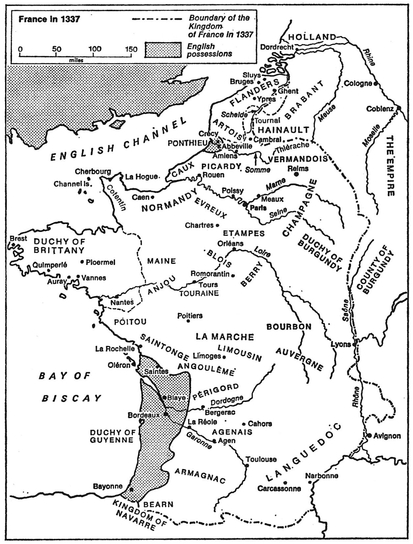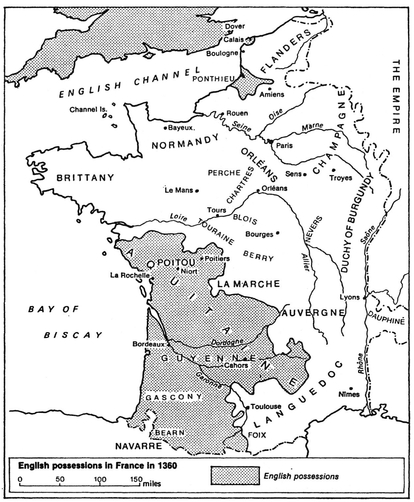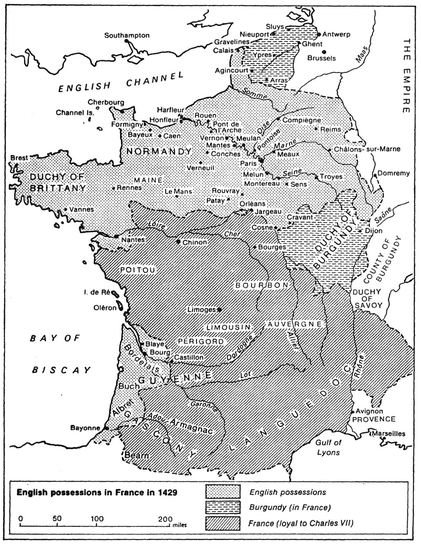The Hundred Years War (35 page)
Read The Hundred Years War Online
Authors: Desmond Seward

In the end the Hundred Years War bankrupted the English government and fatally discredited the Lancastrian dynasty, though England herself may well have been richer from a century of ‘spoils won in France’. In August 1453 Henry VI went mad and six months later the Duke of York became Protector. When Henry recovered in 1455 and re-instated the Beauforts, that long and murderous conflict known as the Wars of the Roses broke out, veterans using the combat skills they had learnt in France on each other. English noblemen had become accustomed to fighting as a way of life and the men-at-arms and archers in their retinues desperately needed employment. York and Somerset fell in battle, Kyriell and Rivers died on the scaffold, Scales was lynched by a Yorkist mob, and many of the men who were killed at St Albans and Towton or even at Barnet and Tewkesbury had fought under Old Talbot. The rise of the House of York and the Wars of the Roses cannot be understood without some knowledge of the Hundred Years War.
At first the English regarded their expulsion from Normandy and Guyenne as purely temporary. At Bordeaux and Bayonne the French had to build citadels to cow the Guyennois, and in 1457 Charles VII wrote apprehensively to the King of Scots how he ‘had to watch the coast daily’. In 1475 Edward IV (son of a Lieutenant General of France, and born at Rouen) at last marched out from Calais towards the Somme ; however, at Picquigny he signed a seven-year truce with Louis XI, agreeing to withdraw for an indemnity of 75,000 crowns and an annual pension of 60,000. But no proper peace treaty was ever signed, and as late as 1487 Henry VII hoped to recover Guyenne ; he intervened in Brittany the following year and invaded France in 1492. Henry VIII also took an army across the Channel, defeating the French at the Battle of the Spurs in 1513 and capturing Thérouanne and Tournai—the first French towns gained by English arms since the days of Bedford and Old Talbot. In 1523 he signed a secret treaty with the Duke of Bourbon and the Emperor Charles V, which would have given him the French crown together with Paris and the north-western provinces of France and would have restored the Lancastrian dual monarchy. This came to nothing, though in 1544 he took Boulogne. Even after the loss in 1558 of Calais, their last foothold, English monarchs continued to call themselves Kings or Queens of France until the Treaty of Amiens in 1802.
The only English memorials of the Hundred Years War are Lord Berners’s majestic rendering of Froissart, and Shakespeare’s historical plays. For the French it is a different story. France suffered horribly when England escaped unharmed—every local historian in northern and western France will show the tourist a chateau or a church which was sacked by the English. There is a strong case for maintaining that the origin of the uneasy relationship between the two peoples can be found in the battles, sieges and the
chevauchées,
the ransoming and the looting, the
pâtis,
the burning and the killing by the English in France during the Hundred Years War.
chevauchées,
the ransoming and the looting, the
pâtis,
the burning and the killing by the English in France during the Hundred Years War.



Appendix
A Note on Currency
It is impossible to give even approximate estimates of the purchasing power of late-medieval money. We know from the income-tax returns of 1436 (imposed on incomes of more than £20) that the average income of a nobleman was £865, of a well-to-do knight £208, of a lesser knight £60, of an esquire £24, and of minor gentry, merchants, yeoman and important artisans from £15 to £19. At this date a good ploughman could make perhaps £4 a year, though before the Black Death he might have made as little as 10 shillings.
The English pound sterling of 20 shillings or 240 pence must not be confused with the French pound
tournois
of 20
sous
or 240
deniers.
(There was also the pound
parisis
and the pound
bordelaise,
but these are not used in this book.) The English mark of silver was worth 13s 4d sterling, the mark of gold £6 sterling. These pounds—sterling and
tournois
—and marks were all what was termed monies of account. The exchange rate between English and French monies of account was frequently adjusted by the two governments ; in the fourteenth century a pound sterling was usually worth 6 pounds
tournois
but in the fifteenth century it rose to 9 pounds
tournois.
tournois
of 20
sous
or 240
deniers.
(There was also the pound
parisis
and the pound
bordelaise,
but these are not used in this book.) The English mark of silver was worth 13s 4d sterling, the mark of gold £6 sterling. These pounds—sterling and
tournois
—and marks were all what was termed monies of account. The exchange rate between English and French monies of account was frequently adjusted by the two governments ; in the fourteenth century a pound sterling was usually worth 6 pounds
tournois
but in the fifteenth century it rose to 9 pounds
tournois.
The basic English gold coin was the noble of 6s 8d, originally weighing 7.77 gms but reduced to 6.99 gms in 1412. The French gold coins or crowns were, very roughly, equivalent in weight and value to an English half-noble; they consisted of the
mouton,
so called because it bore an
agnus dei ;
the
franc ;
and the
écu.
The beautiful Anglo-Gallic
salut
of the Lancastrians can also be equated with the half-noble, being worth 3s 4d sterling. Where mentioned, the florins of other European currencies should similarly be equated.
mouton,
so called because it bore an
agnus dei ;
the
franc ;
and the
écu.
The beautiful Anglo-Gallic
salut
of the Lancastrians can also be equated with the half-noble, being worth 3s 4d sterling. Where mentioned, the florins of other European currencies should similarly be equated.
Most English troops would have been paid in silver, consisting of the groat (4d), the half-groat, and the penny and its sub-divisions. Sometimes they would have received French silver or base-metal coins instead, such as the
gros tournois
or the
blanc.
gros tournois
or the
blanc.
Chronology
1337 Edward III claims the throne of France
1340 French navy defeated at Sluys
1346 The English defeat the French at Crécy
1347 Calais falls to the English
1350 Death of Philip VI of France and succession of John II
1356 The Black Prince defeats and captures John II at Poitiers
1360 The Treaty of Brétigny—Aquitaine surrendered to the English
1364 Death of John II of France and succession of Charles V
1369 Charles V ‘confiscates’ Aquitaine—hostilities recommence
1372 Poitiers and La Rochelle admit French troops
1373 John of Gaunt leads his great
chevauchée
from Calais to Bordeaux
chevauchée
from Calais to Bordeaux
1376 Death of the Black Prince
1377 Death of Edward III and succession of Richard II
1380 Death of Charles V of France and succession of Charles VI
1381 Peasants’ Revolt in England
1383 Expedition of the Bishop of Norwich to Flanders
1386 The French prepare to invade England but then abandon the plan
1389 Truce of Leulinghen between French and English
1399 Deposition of Richard II and succession of Henry IV
1407 Murder of the Duke of Orleans by agents of John, Duke of Burgundy
1412 The Duke of Clarence leads a
chevauchée
from Normandy to Bordeaux
chevauchée
from Normandy to Bordeaux
1413 Death of Henry IV and succession of Henry V
1415 Henry V invades France, captures Harfleur and wins the battle of Agincourt
1417 Henry V begins the conquest of Normandy
1419 Rouen falls to the English. John, Duke of Burgundy is murdered by Armagnacs. Alliance between Burgundians and English
1420 Treaty of Troyes ; Charles VI recognizes Henry V as heir to the French throne and Regent of France. The English occupy Paris
1421 Duke of Clarence defeated and killed by the Armagnacs at Baugé
1422 Deaths of Henry V and Charles VI. Henry VI of England recognized as King of France north of the Loire while only France south of the Loire recognizes Charles VII
1423 The Earl of Salisbury defeats the Dauphinists at Cravant
1424 The Regent Bedford defeats the French at Verneuil
1428 The Earl of Salisbury begins the siege of Orleans
1429 Sir John Fastolf defeats the Dauphinists at the ‘Battle of the Herrings’. Joan of Arc relieves Orleans and defeats Fastolf and Lord Talbot at Patay. Charles VII crowned at Rheims, but Joan fails to recapture Paris
1430 Capture of Joan of Arc
1431 Burning of Joan of Arc. Coronation of Henry VI at Paris
1435 Death of the Regent Bedford. Treaty of Arras between Charles VII and the Burgundians who abandon the English alliance
1436 Charles VII recaptures Paris
1441 Fall of Pontoise to the French—the last English stronghold in the Ile de France
1444 Truce of Tours between French and English
1448 The English surrender Maine to the French
1449 Charles VII invades Normandy and takes Rouen
1450 English defeated at Formigny. All Normandy falls to the French
1451 Charles VII conquers Guyenne
1452 At the invitation of the Guyennois, Lord Talbot reoccupies Bordeaux
1453 English defeated at Castillon and finally lose Bordeaux
Select Bibliography
CHRONICLES AND OTHER CONTEMPORARY SOURCESADAM OF MURIMUTH,
Adae Murimuthensis, Continuatio Chronicarum
(ed E. M. Thompson), Rolls Series, 1889.
Adae Murimuthensis, Continuatio Chronicarum
(ed E. M. Thompson), Rolls Series, 1889.
ADAM OF USK,
Chronicon Adae de Usk
(ed E. M. Thompson), London, 1876.
Chronicon Adae de Usk
(ed E. M. Thompson), London, 1876.
BASIN, THOMAS,
Histoire de Charles VII
(translated C. Samaran), Paris, 1964.
Histoire de Charles VII
(translated C. Samaran), Paris, 1964.
BAKER, GEOFFREY LE,
Chronicon Galfridi le Baker de Swynebroke
(ed E. M. Thompson), Oxford, 1889.
Chronicon Galfridi le Baker de Swynebroke
(ed E. M. Thompson), Oxford, 1889.
BEL, JEAN LE,
Chroniques
(ed J. Viard and E. Déprez), Paris, 1904-1905.
Chroniques
(ed J. Viard and E. Déprez), Paris, 1904-1905.
BLONDEL, ROBERT, ‘De Reductione Normanniae’ in
Letters and Papers ...
(ed J. Stevenson), see below.
Letters and Papers ...
(ed J. Stevenson), see below.
BONET, HONORÉ,
The Tree of Battles of Honoré Bonet
(translated G. W. Coopland), Liverpool, 1949.
The Tree of Battles of Honoré Bonet
(translated G. W. Coopland), Liverpool, 1949.
BOUVIER, GILLES LE, ‘Le Recouvrement de Normandie’, in
Letters and Papers ...
(ed J. Stevenson), see below.
Letters and Papers ...
(ed J. Stevenson), see below.
CAPGRAVE, j.,
The Chronicle of England
(translated F. C. Hingeston), Rolls Series, 1858.
The Chronicle of England
(translated F. C. Hingeston), Rolls Series, 1858.
CHANDOS HERALD,
The Black Prince: An Historical Poem, written in French by Chandos Herald,
Roxburghe Club, 1842.
The Black Prince: An Historical Poem, written in French by Chandos Herald,
Roxburghe Club, 1842.
CHASTELLAIN, GEORGES,
Oeuvres
(ed Kervyn de Lettenhove), Brussels, 1863—1866.
Oeuvres
(ed Kervyn de Lettenhove), Brussels, 1863—1866.
CHARTIER, JEAN,
Chronique de Charles VII
(ed V. de Viriville), Paris, 1858.
Chronique de Charles VII
(ed V. de Viriville), Paris, 1858.
Chronicon de Lanercost
(translated Lord Berners), in Tudor Translations, 1927—1928.
(translated Lord Berners), in Tudor Translations, 1927—1928.
Chronique du Mont-Saint-Michel (1343—1468)
(ed S. Luce), Paris, 1879—1883.
(ed S. Luce), Paris, 1879—1883.
ELMHAM, THOMAS,
Henrici Quinti AngliaeRegis Gesta,
English Historical Society, 1850.
Henrici Quinti AngliaeRegis Gesta,
English Historical Society, 1850.
ESCOUCHY, MATTHIEU D‘,
Chroniques de Matthieu d’Escouchy,
Paris, 1863—1864.
Chroniques de Matthieu d’Escouchy,
Paris, 1863—1864.
FROISSART, JEAN,
Oeuvres: Chroniques
(ed Kervyn de Lettenhove), Brussels, 1867—1877.
Oeuvres: Chroniques
(ed Kervyn de Lettenhove), Brussels, 1867—1877.
JUVENAL DES URSINS, JEAN,
Histoire de Charles VI 1380
—
1422,
Paris, 1841.
Histoire de Charles VI 1380
—
1422,
Paris, 1841.
KNIGHTON, HENRY,
Chronicon Henrici Knighton,
Rolls Series, 1895.
Chronicon Henrici Knighton,
Rolls Series, 1895.
LESCOT, RICHARD,
Chroniques de Richard Lescot
(ed J. Lemoine), Paris,1896.
Chroniques de Richard Lescot
(ed J. Lemoine), Paris,1896.
LEFEBVRE, J., SEIGNEUR DE SAINT-REMY,
Chronique de J.le Fèvre,
Paris, 1876—1881.
Chronique de J.le Fèvre,
Paris, 1876—1881.
Letters and Papers illustrative of the Wars of the English in France during the Reign of Henry the Sixth, King of England
(ed J. Stevenson), Rolls Series, 1861—1864.
(ed J. Stevenson), Rolls Series, 1861—1864.
LIVIUS, TITUS,
Vita Henrici Quinti
(translated as
The First English Life of King HenryV,
ed C. L. Kingsford), Oxford, 1911.
Vita Henrici Quinti
(translated as
The First English Life of King HenryV,
ed C. L. Kingsford), Oxford, 1911.
Other books
Surrender To Sultry by Macy Beckett
Pieces of Dreams by Jennifer Blake
I Kissed A Playboy by Oates, Sorell
Mariette And The Cowboy (Western Night Series 2) by Rosie Harper
The Galician Parallax by James G. Skinner
El guerrero de Gor by John Norman
A Little Yuletide Murder by Jessica Fletcher
All the Stars in the Heavens by Adriana Trigiani
Vacuum by Bill James